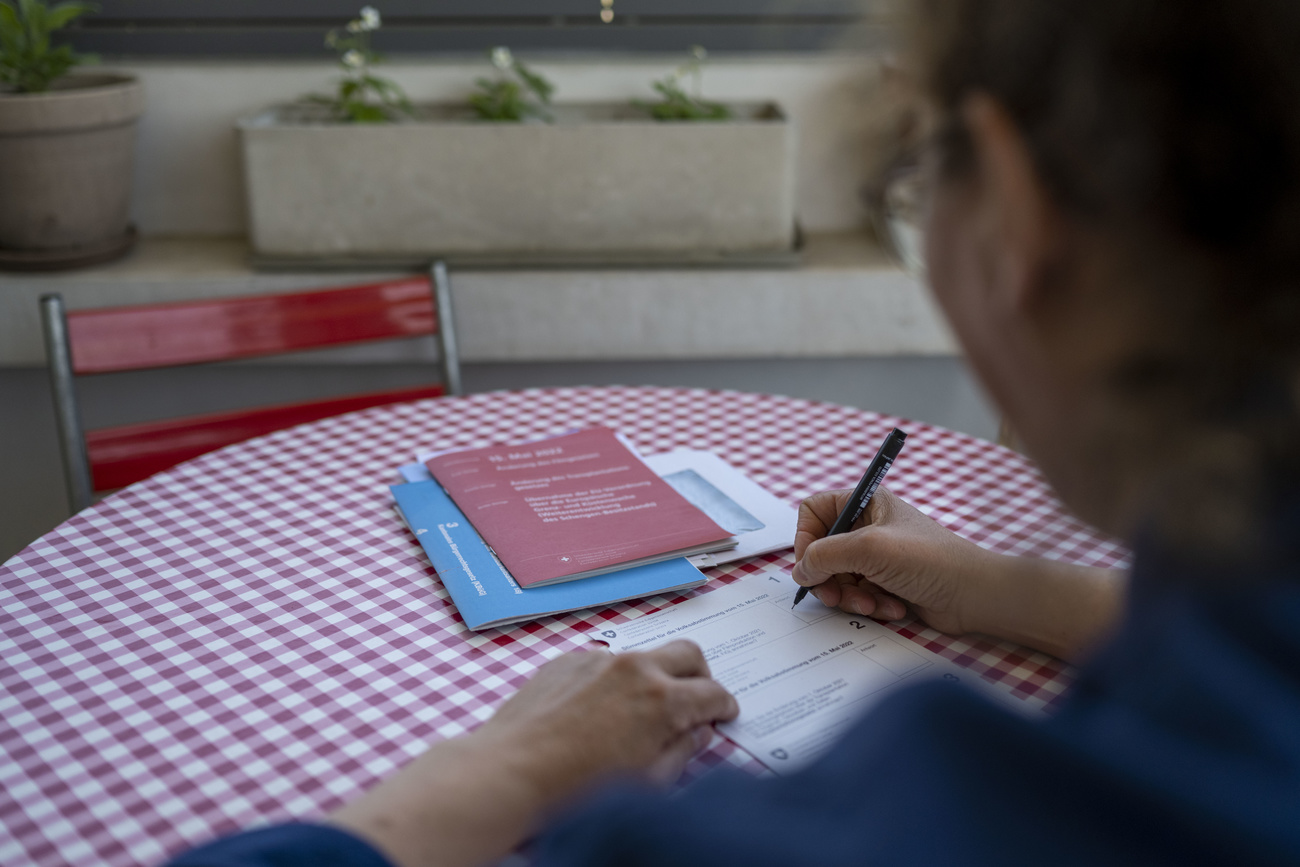
‘What right do I have to decide what happens in Switzerland?’

Some Swiss citizens living abroad voluntarily give up their right to vote in their home country. Others want to continue participating in Swiss political life. Our debate on the subject sparked different reactions from our readers.
“I have been living in Germany for 50 years now. I continued to exercise my right to vote in Switzerland for a short time, but reading up all the background material was a big effort. So I stopped,” writes one reader, under the pseudonym “Beppi Basler”, in the discussion we launched on the political participation of the Swiss Abroad.
This expatriate therefore voluntarily gave up his political rights in his homeland, as he felt he was not well enough informed. He nonetheless believes that Swiss citizens living abroad should be allowed to decide whether or not to vote in their country of origin. “It also depends how often you go to Switzerland and how many ties (family or friends) you have there,” he says.
Beppi Basler therefore defends the status quo. At present, Switzerland places no time limit on the political participation of its diaspora, unlike other European countries. For instance, Germans lose their right to vote after 25 years outside the country. The UK has a similar rule, which kicks in after 15 years.
More
Self-censorship is enough
Gioboa, too, believes that such restrictions are unnecessary. “The Swiss Abroad, who were born abroad (second or third generation), simply do not vote, so they have no impact on important decisions.”
Certainly, not everyone who leaves Switzerland wants to continue voting there. Of the 800,000 Swiss citizens living abroad, some 210,000 are registered with an embassy or representation and can thus exercise their political rights in Switzerland.
SWI user Ademello believes that those who register want to keep close ties with their home country. “I have been an expatriate in Asia for 17 years. I am still much more connected to Switzerland than to my host country. I come here several times a year, my family lives here, I pay taxes here. I am very grateful to Switzerland for being able to stay politically involved and being allowed to vote,” she writes.
Curtailing Swiss expatriates’ right to vote
Others, meanwhile, advocate limiting the voting rights of the Swiss Abroad. One reader, under the name of Max Obrist, explains that he left Switzerland 55 years ago. Even though he still has family ties in Switzerland, he writes: “What right do I have to decide what happens in Switzerland? I can no longer judge local circumstances there.”
Several other contributors share this view. “When you’re gone, you’re gone. You concern yourself with the part of the world you live in,” sums up Claude2011. Thack, meanwhile, writes: “In my opinion, too many Swiss Abroad can vote. Many have no ties with Switzerland at all.” And another reader adds: “They have left their country and are actively invested in the wellbeing of another state. They will therefore not put Swiss interests to the fore. I really don’t think they should have a say in what goes on in Switzerland.”

More
Do the Swiss Abroad have enough power?
Right to vote on certain subjects
Others, meanwhile, would like to limit Swiss expatriates’ right to vote to issues that concern them. “I don’t think the Swiss Abroad should vote on local issues. Just national,” writes one person, under the pseudonym Lynx. A British national, he regrets having lost the right to vote in the UK after 15 years: “I, and many expats, wish we still had the right as we might have stopped Brexit.”
Franz Muheim also stresses the importance for the Swiss diaspora of being able to vote on certain issues. “Many votes are about social security issues or Europe. Many of us live in Europe or have paid into Swiss social insurances for decades, maybe even our whole working lives. So we should be able to have our say on these matters.”
Other voices yet call for extending the political rights of the Swiss Abroad. “The Swiss Abroad can also bring new ideas to the political debate and contribute to progress in Switzerland. I think they should be represented in the Swiss parliament,” argues one user.
Representation in parliament
The Bernese entrepreneur Andreas Ziegler-MendonçaExternal link, who lives in Mozambique, believes that “the Swiss Abroad should have two members in the Senate and proportional representation in the House of Representatives, like a virtual canton”. He is convinced that Switzerland would thus benefit more from the long-standing local experience of its citizens abroad.
This idea does not find favour with everyone, however. One contributor, going by the name of Frodo, finds it unrealistic for someone to sit in the federal parliament while living abroad. “You cannot sit in a legislature while living in a country with different laws,” he argues. Another user adds that it is not worth re-organising the system for people who have left Switzerland. “Why change the structure of a country for people who don’t even want to live there anymore?”
So far, only one Swiss Abroad has ever sat in the federal parliament. The former Swiss ambassador to Germany, Tim Guldimann, based in Berlin, was elected to the House of Representatives in 2015, when he was on the list of the left-wing Social Democratic Party for his home canton Zurich. He resigned in 2018, however (before the end of the legislature), as he found it too difficult to reconcile his political mandate with his life abroad.
Translated from French by Julia Bassam.

More
New app strengthens Switzerland’s link with citizens abroad

In compliance with the JTI standards
More: SWI swissinfo.ch certified by the Journalism Trust Initiative


























You can find an overview of ongoing debates with our journalists here . Please join us!
If you want to start a conversation about a topic raised in this article or want to report factual errors, email us at english@swissinfo.ch.